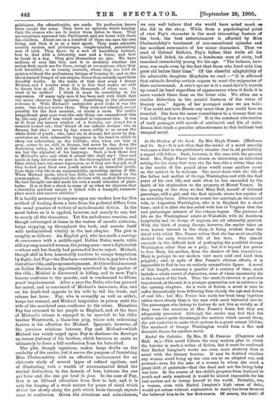In the Shadow of the Lord. By Mrs. Hugh Fraser.
(Methuen and Co. 6s.)—It is not often that the reader of a novel actually welcomes a hint in the publisher's circular that in all probability a sequel will follow. Such, however, is the case with the present book. Mrs. Hugh Fraser has chosen so interesting an historical setting for her story that were she far loss able a writer than she is the merits of the period alone would cause another novel on the subject to be welcome. The novel deals with the life of the father and mother of George Washington and with the first years of his own life, and ends when he has succeeded by the death of his stepbrother to the property at Mount Vernon. In the opening of the story we find Mary Ball, herself of Colonial parentage, still a girl, and the first episode shows her repulse of an unworthy lover. Afterwards comes her marriage, as his second wife, to Augustine Washington, who is in England for a short time; and it is after she has sailed with him to Virginia that the real picturesque interest of the volume begins. The pictures of life on the Washingtons' estate at-Wakefield, with its Southern hospitality and its troops of negroes, are all admirably painted. With the birth of young George, however, the reader takes an even keener interest in the story, it being evident from the detail with which Mrs. Fraser writes that she has most carefully studied the early domestic life of her hero. She almost succeeds in the difficult task of portraying the youthful George Washington other than as a prig ; but it is beyond her power to free Mary, his mother, from the shadow of this imputation. Mary is perhaps to our modern view more cold and hard than priggish ; and, in spite of Mrs. Fraser's obvious efforts, it is impossible to find in her an entirely sympathetic figure. A novel of this length, covering a quarter of a century of time, must include a whole crowd of characters, some of whom necessarily die in the course of the book. Thus the reader's interest is perforce transferred, at the end, to a younger generation not in existence in the opening chapters. As a work of fiction, a novel is sure to suffer dramatically from following thus closely the ups and downs of real life ; but Mrs. Fraser has made her book hang together rather more closely than is the case with most historical novels. The personages who belong to history do not live as vividly as if they were the creations of Mrs. Fraser's brain, but they are adequately presented. Although the reader may feel that the author cannot quite disentangle the motives which moved them, she yet contrives to make their actions to a great extent lifelike. The manhood of George Washington would form a fine and dramatic theme for another novel.










































 Previous page
Previous page